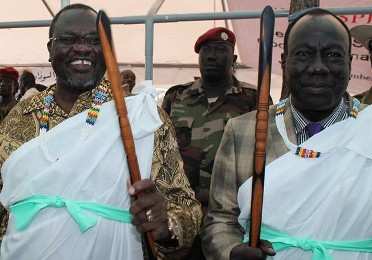South Sudanese rebels acquire sophisticated weapons – official
December 30, 2014 (ADDIS ABABA) – As the two warring parties in South Sudan are believed to have prepared for an all-out war this dry season if the ongoing peace talks fail in Addis Ababa, a rebel source has confirmed acquisition of advanced weapons that would boost their military capacity against president Salva Kiir’s government.

The rebel official who spoke on condition of anonymity because of sensitivity of the matter boasted that their previously unorganised and ill-equipped forces, mainly from the Nuer ethnic group, for the last one year had successfully withstood superior combined forces of SPLA-Juba, UPDF of Uganda, and Darfur rebel groups
“Now we are better equipped militarily. If the regime in Juba doesn’t want peace and hopes to crash us this dry season, we will prove them wrong and they will regret this,” he said.
The source indicated that the rebels acquired anti-tank and anti-aircraft shoulder-launched surface-to-air missiles including QW-18 Man-Portable Air-Defence System (MANPADS), which is capable of destroying tanks and armoured vehicles. It also destroys flying military aircrafts up to 60,000 feet above the ground with accuracy to the target, he asserted.
The sophisticated weapons, if confirmed, would pose danger to the air superiority which the Ugandan army allied to president Kiir enjoyed over South Sudan’s air space since December last year.
The rebel source however could not disclose the source of the weapons and dismissed suggestions that the Sudanese government might have trained and supplied the South Sudanese opposition.
Juba has also been stockpiling during the wet season for a showdown this dry season which has already begun. Reports in June indicated that the government ferried weaponry from China through the Kenyan sea port of Mombassa. Other weapons including tanks come through Uganda.
United Nations has warned of possible sanctions should the belligerent parties fail to halt the fighting and sign a peace agreement.
The recent round of talks only made a little progress as the two parties disagreed on substantial issues including the power-sharing, security arrangements and reforms including on how to share the wealth of the country.
The rebels also called on president Kiir to step aside during a transitional period, accusing him of instigating the war and its consequent massacres of the Nuer ethnic group, saying he is no longer legitimate. However, Juba has refused the demand.
The Intergovernmental Authority on Development (IGAD), which brokers the negotiations, also warned of punitive measures, including sanctions and military intervention, if the war continues, as fears mount that the war may be regionalized.
Observers warn that the dry season may witness the worst deadly clashes between the two factions who seemed to have used the wet season in buying time in the peace process while devoting energy to arming themselves.
Fighting erupted in mid-December last year when what seemed to be a healthy internal debate on reforms among senior leaders within the ruling SPLM party turned violent.
President Kiir, of Dinka ethnicity, allegedly ordered the commander of his presidential guards to disarm Machar’s ethnic Nuer soldiers among the guards, accusing the latter of planning a military coup.
Machar, who narrowly escaped assassination in the capital, Juba, later on formed an armed movement, but dismissed the accusation, saying it was a ploy used by the president in order to silent reformist voices within the ruling party and government.
Tens of thousands of people have died, nearly two million displaced internally and to the neighbouring countries of Sudan, Uganda, Kenya and Ethiopia, with four million others threatened by hunger and diseases.
(ST)
